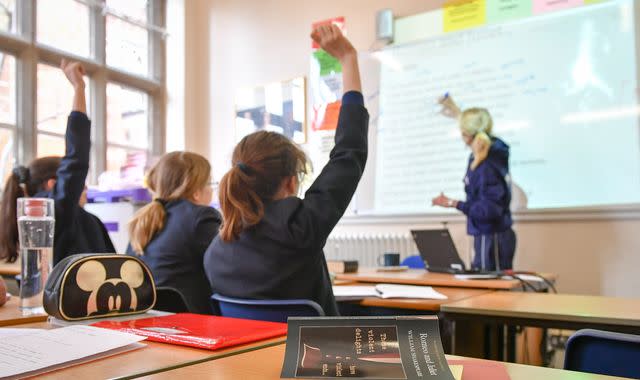Schools to receive guidance on gender issues after 'concerning' report, says Rishi Sunak

Rishi Sunak said he is "very concerned" about a report suggesting schools are not telling parents as soon as a child questions their gender identity.
The prime minister said it is important parents "know what's going on" as he pledged to publish new government guidance on how teachers should respond to transgender issues "for the summer term".
According to a paper by centre-right thinktank Policy Exchange, safeguarding principles are being "routinely disregarded in many secondary schools" when it comes to gender identity.
It said some schools believe that informing parents when their child expresses a wish to change gender or questions their identity breaches their confidentiality.
Asked about the findings during a visit to Oxfordshire on Thursday, the prime minister said: "I'm very concerned about these reports.
"For me, the safety and wellbeing of our children is of paramount importance. And I've also been clear that parents must be able to know what is being taught to their kids in school especially on these sensitive areas."
Mr Sunak said the government is already reviewing its relationships and sex education guidance "to make sure it is age-appropriate for children".
"But what I'm also going to say today is that for the summer term we are going to make sure we publish guidance for schools so that they know how to respond when children are asking about their gender," he added.
Read more:
Starmer will lose election campaign on day one 'unless he shifts his trans rights position'
JK Rowling says she knew her views would make Harry Potter fans unhappy
The PM acknowledged "these are really sensitive areas".
"It is important we treat them sensitively and parents know what's going on. And we'll make sure that's what happens."
The research by Policy Exchange, which sent Freedom of Information (FoI) requests to more than 300 secondary schools in England, suggested that some do not maintain single-sex toilets or changing rooms.
It said: "While many schools believe they are acting in a child's best interests, there is no circumstance in which safeguarding norms should be compromised. Nonetheless, this is happening across the country."
In a series of recommendations, the paper said schools should automatically inform parents when a child questions their gender unless there is a compelling reason for them not to be informed.
In a foreword to the report, Labour MP Rosie Duffield - who has been outspoken on gender issues - said: "Policy Exchange exposes the reality that this ideology is widespread across secondary schools.
"This government has failed children by allowing partisan beliefs to become entrenched within the education system. Meanwhile, the opposition has failed to pull them up on it."
Schools 'caught in crossfire of beliefs'
Just over half of the schools responded to Policy Exchange's FOI questions on gender policies submitted in December.
The research suggested 28% of those who responded are reliably informing parents as soon as a child questions their gender.
According to the report, the same amount are not maintaining single-sex toilets and 19% are not maintaining single-sex changing rooms.
The report concluded: "Our research reveals there to be a safeguarding blind spot when it comes to the issue of sex and gender."
Geoff Barton, general secretary of the Association of School and College Leaders (ASCL), said schools "work very hard to be sensitive to the needs of pupils questioning their gender identity".
He said that this is being done "in the context of a public minefield of strongly held and opposing views".
The union leader said the government guidance is "clearly needed so that schools are able to draw on an established set of guidelines rather than constantly being caught in the crossfire between opposing views and beliefs".
A Department for Education (DfE) spokesperson said: "We are clear that schools should make sure they work with parents, pupils and public services to decide what is best for individual children.
"Parents have a right to view teaching materials and copyright law does not prevent a parent from viewing external resources on school premises."

 Yahoo News
Yahoo News 
